Home > Articles > The Archives > Bill Emerson
Bill Emerson
By Gary A. Henderson and Richard K. Spottswood
Reprinted from Bluegrass Unlimited Magazine
April 1968, Volume 2, Number 10
That Bill Emerson is currently just about the most skilled and respected banjo picker in the country will be disputed by few. Yet it will come as a surprise to many that his origins and background are entirely urban.
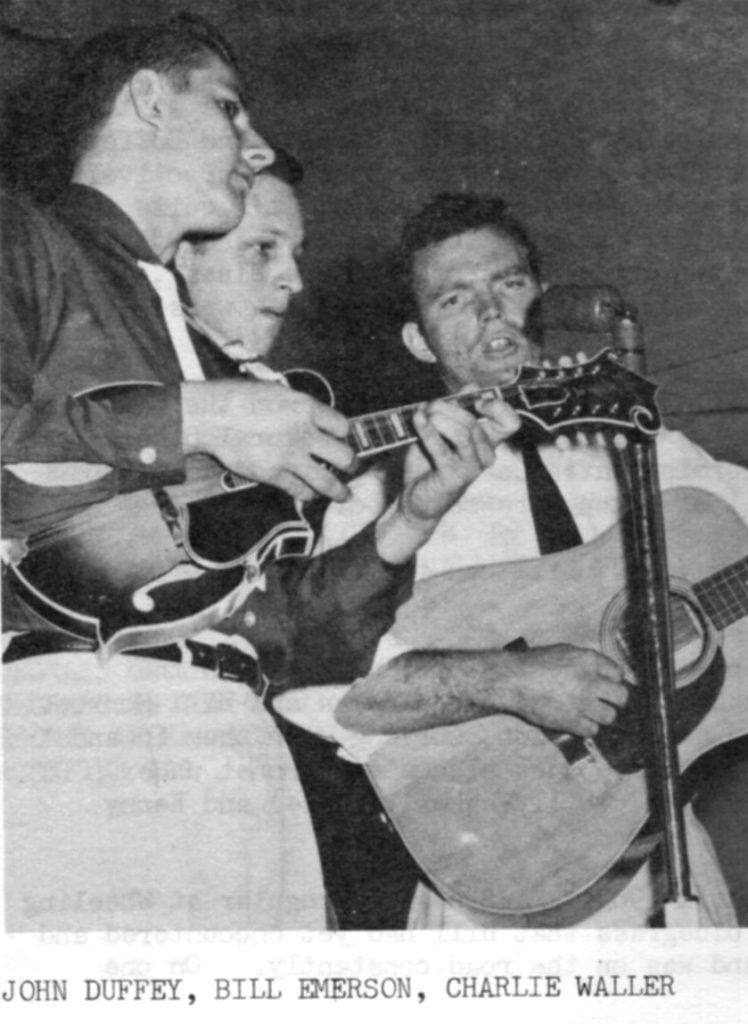
He was born William Hundley Emerson, Jr. in Washington, D. C. on January 27, 1938 and raised in well-heeled Bethesda, Maryland. A neighbor from South Africa, Michele Horrocks owned some of the early Flatt and Scruggs records, and communicated his enthusiasm for Earl’s banjo playing to young Bill. Bill had already been fooling around with an expensive electric guitar he’d gotten for Christmas, but it was soon swapped for a $60 banjo. He can recall many subsequent afternoons with another native Bethesdan, John Duffey, who showed Bill all he knew on the instrument. The first live bluegrass Bill heard was Duffey, banjoist Bill Blackburn and a guitar player jamming away in the parking lot at the Manassas, Virginia drag races.
Next he ran into Smitty Irwin, who was playing with Bill Harrell at a southeast Washington bar. Bill picked up a lot from Irwin, and soon afterwards landed his first job, a Saturday morning radio show with Uncle Bob and his Blue Ridge Partners, over WINX, Rockville, Maryland; he also worked jobs with them at the local Moose lodge when the opportunity presented itself. Next came a gig with Roy and Curly Irwin (Smitty’s father and brother) at the Pine Tavern in Washington, one of the early clubs in D. C. that consistently featured bluegrass. Fiddler Art Wootten also worked with the Irwins, and Bill found his musicianship and knowledge of early fiddle tunes a source of constant inspiration.
Next Bill joined Buzz Busby’s group at WTOV, Salisbury, Maryland. Other members were Charlie Waller and bassist Vance Truell, from Fontana, North Carolina. (It was Truell, not Emerson, who played banjo on “Your Red Wagon”/”This Guy’s Gotta Go”, which Buzz cut for Bill Carroll’s Carroll label in 1955.) Not long afterwards Buzz was seriously hurt in an auto accident. In order to keep working, Bill asked John Duffey to fill in. Charlie Waller wanted to work in the Washington area, and he joined on guitar. Duffey soon set about arranging songs and teaching Charlie and Bill to sing trios, especially in the then emerging style of the Osborne Brothers.
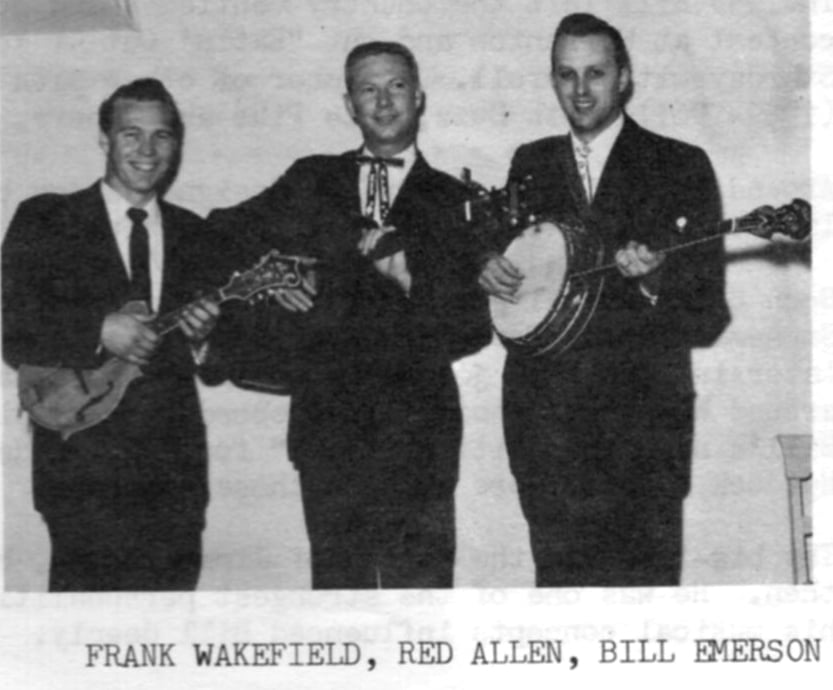
Soon the group chose a name for themselves, the “Country Gentlemen”, and began working regularly at WARL in Arlington, Virginia, a job Bill got for them through leading DJ Don Owens. It was at the WARL studios that their first record was made: Carter Stanley’s “Going To The Races”, and Duffey’s own “Heavenward Bound”. Tom Morgan and Carl Nelson filled in on bass and fiddle respectively for the record, which was released on the Dixie label with no catalog number. It’s quite rare today, though it enjoyed local success at the time (1957). It also led to a series of five Starday records, beginning with Bill’s fine instrumental arrangement of “Bye Bye Blues”, which he called “Banjo In The Backwoods”. For awhile, Bill and the Gentlemen worked on Owens’ TV show on Washington’s WTTG.
In 1959 Bill left the Country Gentlemen and joined Bill Harrell. That year he won the banjo contest at Warrenton and cut “Eatin’ Out Of Your Hand”, “Cue Track Mind” and several others for Starday with Harrell. A number of other pick up recording dates were made during this period (1959-1961), with Buzz, Pete Pike and others, not all of which were released.
Around this time Earl Scruggs designed a new banjo for Vega. Bill won the first one off the line at a July 4th contest at Luray, Virginia in 1960. Soon Bill Harrell got married, and his group broke up. Subsequently Bill worked with the Stoneman family for six months and worked shows with Bill Clifton, Mac Wiseman and Bill Monroe. Later in 1960 Bill joined forces with Frank Wakefield and Red Allen, working with them in and around Washington and making records. They did a couple of budget albums on Coronet under Bill’s name and “Little Birdie” for Rebel under Red’s name. Billy Baker (fiddle) and Kenny Haddock (dobro) were also on these sessions.
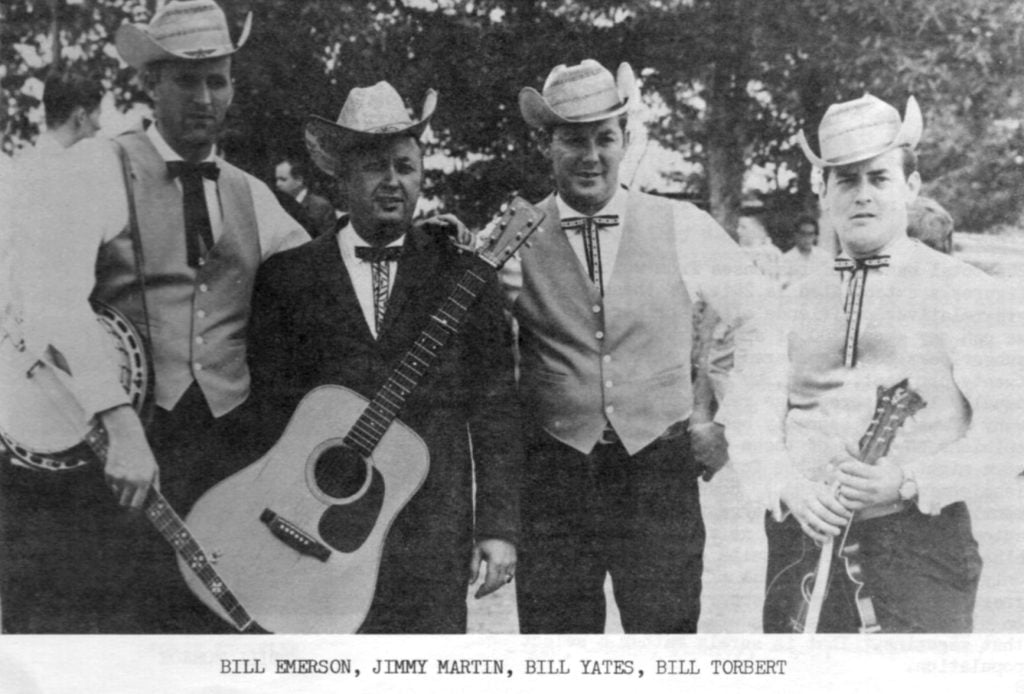
The big-time, in the person of Jimmy Martin, beckoned in 1962. Martin was a regular at Wheeling then. He was one of the strongest personalities in bluegrass that Bill had yet encountered and his musical concepts influenced Bill deeply. The band was on the road constantly. On one occasion, Bill remembers, they were going across a West Virginia mountain in Jimmy’s new Cadillac. A groundhog ran across the road. Jimmy saw it, slammed on the brakes and jumped out carrying a billy club he kept under the seat. The groundhog got across the road, turned around and reared up in defiance. Just as Jimmy was finishing him off, Bill turned around just in time to see the Cadillac beginning to coast down the mountain. Bill’s quick thinking and long legs saved the day, and he caught it just in time.
Bill left Martin in 1963 to work around the Washington area, but rejoined in 1964. At this time the group consisted of Bill, Martin, Kirk Hansard, Lois Johnson, Paul Williams and Zeb Collins. It was an eventful year. They flew to Newfoundland to play for servicemen and worked a successful gig at the Golden Nugget in Las Vegas. (Is that the Spanish plural for “banjo”?)
One year and 70,000 miles later, Bill left Martin to work in D. C. He teamed up with the Yates brothers and Ferrill Brown. They worked at WKCW, Warrenton, Virginia and made two semi-commercial sides (“Love’s Chance Again”/”Please Keep Remembering”) for DJ Tom Reeder’s Kash label. In time Red Allen replaced Brown, and the group became the Kentuckians. They recorded a single for Pete Robert’s Glenmar label and an album for Dick Spottswood’s Melodeon.
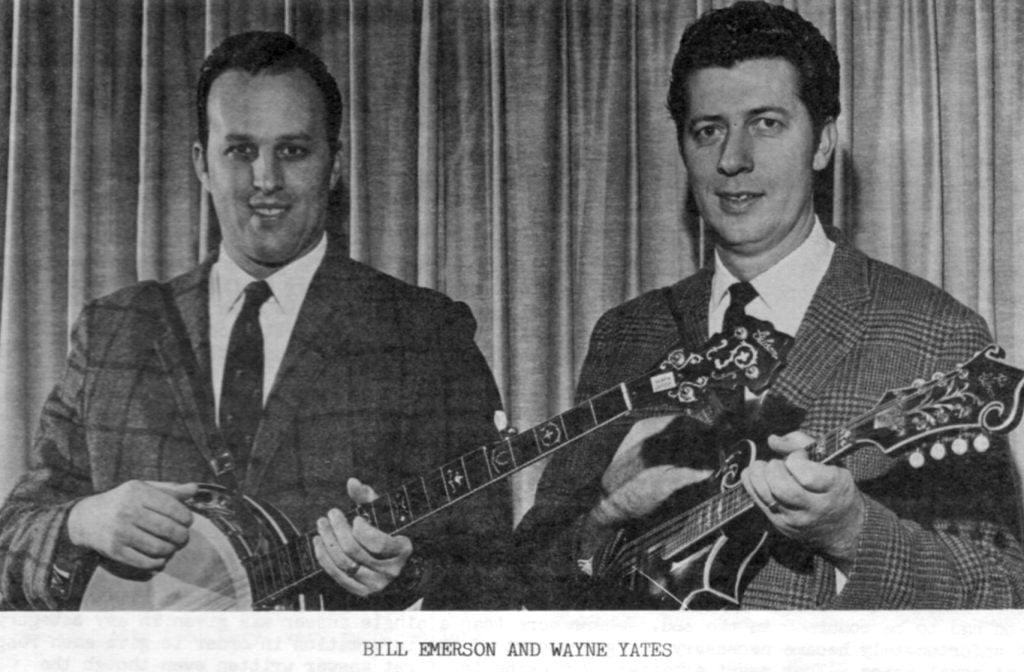
Bill rejoined Martin in late 1964, taking Bill Yates with him on bass. Others working with Martin at the time were Vernon Derrick (fiddle) and Bill Torbert (mandolin). This was Bill’s last tour with Martin. He returned to Washington in 1966 and resumed forces with Wayne Yates. They’re still working together as the Kentucky Gentlemen, with Cliff Waldren (guitar) and Earl Brown (bass). They currently are working at Bethesda’s Red Fox and at the Embers in Alexandria, Virginia, with new records in prospect for Rebel and Arhoolie.
Bill is just 30, so an assessment of his career would probably be premature. But even so, one can safely say he is unsurpassed in his particular style today. There’s no doubt we can count on even greater music to come.
Share this article
1 Comment
Leave a Comment Cancel Reply
This site uses Akismet to reduce spam. Learn how your comment data is processed.
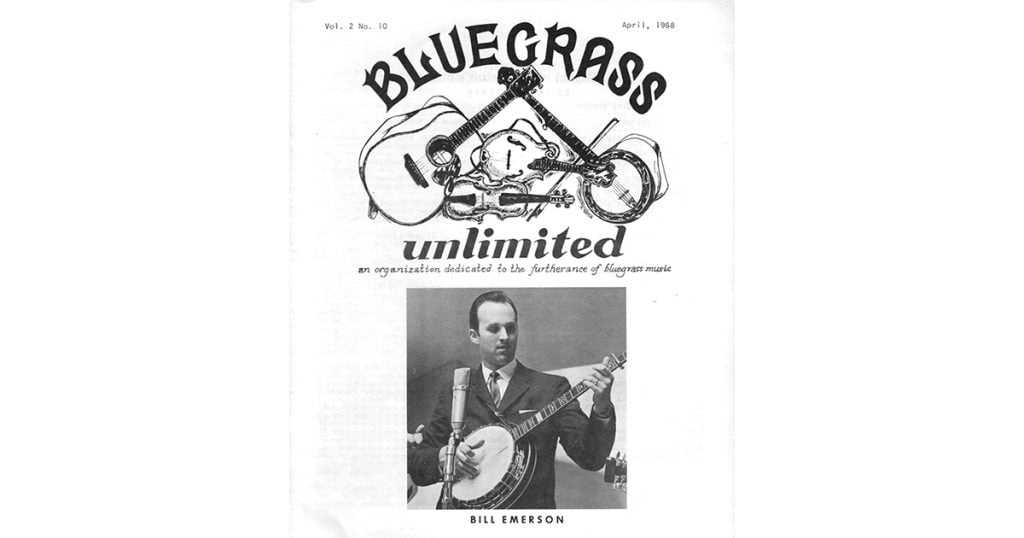

So sad to hear Bill Emerson’s gone. I have the Gibson archtop banjo he’d owned before me. It had belonged to Rudy Lyle while he was with Bill Monroe. I bought it from Harry West in NYC for, I recall, $450 around 1962-3. Harry mailed it to me in L.A. in a cardboard box. I quizzed Bill about this banjo, maybe at the ‘Gent’s gig at ‘In the Alley’ in Escondido circa 1972, maybe at a Country Current gig at a Thousand Island Bluegrass Festival, maybe with Sweet Dixie at Windgap.